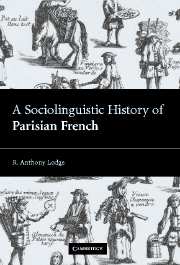Book contents
- Frontmatter
- Contents
- List of maps
- List of tables
- List of figures
- Acknowledgments
- List of phonetic symbols
- Part 1 Preliminaries
- Introduction
- 1 ‘The French of Paris’
- 2 The analytical frame
- Part 2 The pre-industrial city
- Part 3 The proto-industrial city
- Part 4 The industrial city
- Conclusion
- Appendix Literary imitations of low-class speech
- Bibliography
- Index
Introduction
Published online by Cambridge University Press: 22 September 2009
- Frontmatter
- Contents
- List of maps
- List of tables
- List of figures
- Acknowledgments
- List of phonetic symbols
- Part 1 Preliminaries
- Introduction
- 1 ‘The French of Paris’
- 2 The analytical frame
- Part 2 The pre-industrial city
- Part 3 The proto-industrial city
- Part 4 The industrial city
- Conclusion
- Appendix Literary imitations of low-class speech
- Bibliography
- Index
Summary
Writing a sociolinguistic history of a city as large and complex as Paris is a risky, even foolhardy undertaking. Although not a major centre of population in Antiquity, Paris became, in the medieval period, an urban giant, dwarfing the other towns of France and outstripping even the great conurbations of the Low Countries and northern Italy:
As Fernand Braudel observed, ‘Paris is a city on its own’, compared not just with the other French cities that it has always completely overshadowed, but, at least up to the second third of the seventeenth century, with the other cities of early modern Europe. What strikes us first of all is the longstanding character of this situation. Whereas Madrid and London did not experience spectacular growth until 1630 or even 1650, and Amsterdam did not become a metropolis until after 1600, the population of Paris had certainly reached or exceeded 200,000 by the beginning of the fourteenth century, prior to the Black Death, the economic depression of the late Middle Ages and the Hundred Years War…. With this uniquely large population, Paris, around 1320, was far ahead of the great economic centres of the day: Ghent, Bruges, Genoa and Venice.
(Jacquart 1996: 105)It has remained near the top of the European urban hierarchy ever since. Great metropolises are not only large, they are demographically complex, comprising rich polyphonies of nested and inter-related communities.
- Type
- Chapter
- Information
- A Sociolinguistic History of Parisian French , pp. 3 - 4Publisher: Cambridge University PressPrint publication year: 2004



